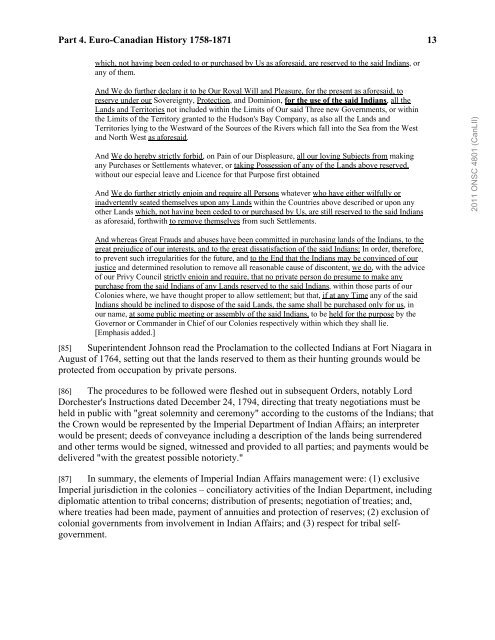Keewatin v. Minister of Natural Resources
Keewatin v. Minister of Natural Resources
Keewatin v. Minister of Natural Resources
- No tags were found...
Create successful ePaper yourself
Turn your PDF publications into a flip-book with our unique Google optimized e-Paper software.
Part 4. Euro-Canadian History 1758-1871 13which, not having been ceded to or purchased by Us as aforesaid, are reserved to the said Indians, orany <strong>of</strong> them.And We do further declare it to be Our Royal Will and Pleasure, for the present as aforesaid, toreserve under our Sovereignty, Protection, and Dominion, for the use <strong>of</strong> the said Indians, all theLands and Territories not included within the Limits <strong>of</strong> Our said Three new Governments, or withinthe Limits <strong>of</strong> the Territory granted to the Hudson's Bay Company, as also all the Lands andTerritories lying to the Westward <strong>of</strong> the Sources <strong>of</strong> the Rivers which fall into the Sea from the Westand North West as aforesaid.And We do hereby strictly forbid, on Pain <strong>of</strong> our Displeasure, all our loving Subjects from makingany Purchases or Settlements whatever, or taking Possession <strong>of</strong> any <strong>of</strong> the Lands above reserved,without our especial leave and Licence for that Purpose first obtainedAnd We do further strictly enjoin and require all Persons whatever who have either wilfully orinadvertently seated themselves upon any Lands within the Countries above described or upon anyother Lands which, not having been ceded to or purchased by Us, are still reserved to the said Indiansas aforesaid, forthwith to remove themselves from such Settlements.2011 ONSC 4801 (CanLII)And whereas Great Frauds and abuses have been committed in purchasing lands <strong>of</strong> the Indians, to thegreat prejudice <strong>of</strong> our interests, and to the great dissatisfaction <strong>of</strong> the said Indians; In order, therefore,to prevent such irregularities for the future, and to the End that the Indians may be convinced <strong>of</strong> ourjustice and determined resolution to remove all reasonable cause <strong>of</strong> discontent, we do, with the advice<strong>of</strong> our Privy Council strictly enjoin and require, that no private person do presume to make anypurchase from the said Indians <strong>of</strong> any Lands reserved to the said Indians, within those parts <strong>of</strong> ourColonies where, we have thought proper to allow settlement; but that, if at any Time any <strong>of</strong> the saidIndians should be inclined to dispose <strong>of</strong> the said Lands, the same shall be purchased only for us, inour name, at some public meeting or assembly <strong>of</strong> the said Indians, to be held for the purpose by theGovernor or Commander in Chief <strong>of</strong> our Colonies respectively within which they shall lie.[Emphasis added.][85] Superintendent Johnson read the Proclamation to the collected Indians at Fort Niagara inAugust <strong>of</strong> 1764, setting out that the lands reserved to them as their hunting grounds would beprotected from occupation by private persons.[86] The procedures to be followed were fleshed out in subsequent Orders, notably LordDorchester's Instructions dated December 24, 1794, directing that treaty negotiations must beheld in public with "great solemnity and ceremony" according to the customs <strong>of</strong> the Indians; thatthe Crown would be represented by the Imperial Department <strong>of</strong> Indian Affairs; an interpreterwould be present; deeds <strong>of</strong> conveyance including a description <strong>of</strong> the lands being surrenderedand other terms would be signed, witnessed and provided to all parties; and payments would bedelivered "with the greatest possible notoriety."[87] In summary, the elements <strong>of</strong> Imperial Indian Affairs management were: (1) exclusiveImperial jurisdiction in the colonies – conciliatory activities <strong>of</strong> the Indian Department, includingdiplomatic attention to tribal concerns; distribution <strong>of</strong> presents; negotiation <strong>of</strong> treaties; and,where treaties had been made, payment <strong>of</strong> annuities and protection <strong>of</strong> reserves; (2) exclusion <strong>of</strong>colonial governments from involvement in Indian Affairs; and (3) respect for tribal selfgovernment.
















